Microbead Menace
Tiny plastic microbeads threatened the Great Lakes.
Tiny plastic microbeads were found in alarming numbers in the Great Lakes. We led the way to keep them out of the lakes.

Microbeads are tiny plastic particles that were used as an abrasive in many personal care products. They were commonly found in products like facial scrubs, soaps, and shampoos.
When people used personal care products containing microbeads, the tiny plastic pieces didn’t dissolve. Instead, they were rinsed down the drain. Because of their small size and buoyancy, microbeads escaped treatment by sewage plants and ended up in our rivers and lakes.
Research raised serious concerns about the impacts of microbeads on aquatic life. Studies have shown that fish and wildlife of all sizes consume plastic. Once in the water, microbeads can absorb toxic chemicals commonly found in the water. And, they can be mistaken for food by small fish and wildlife.
Many natural alternatives exist, such as ground almonds, oatmeal, and pumice. Phasing out synthetic microbeads was a common sense step to keep plastic out of the Great Lakes.
Bead ban a big win
In 2012, researchers found large numbers of tiny microbeads in the Great Lakes. The news prompted thousands of people to call their elected officials to ask for a ban on microbeads in personal care products.
The Alliance for the Great Lakes led the way in advocating for legislation to phase out microbeads in personal care products. Illinois was the first state in the nation to pass such a law. Many other states quickly followed.
Late in 2015, Congress passed a bill phasing out the production and sale of personal care products containing microbeads. President Obama signed the ban into law in December 2015. The federal law:
- Banned the manufacture of personal care products with microbeads after July 2017.
- Ended the sale of personal care products containing microbeads on July 1, 2018.
Read more about the campaign to keep microbeads out of the Great Lakes.
Learn more about plastic pollution in the Great Lakes.
